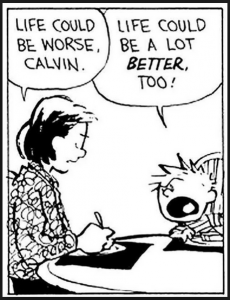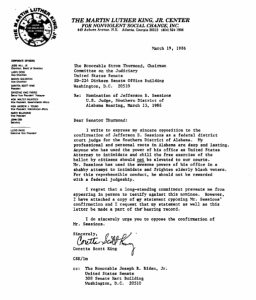From Bill Watterson’s classic comic strip, “Calvin and Hobbes”
“At least” is a mitigating phrase used to begin a response to another person’s expression of difficulty, distress or dissatisfaction. The phrase is often followed by a statement that minimizes the extent, importance or validity of another person’s unpleasant feelings: “At least you weren’t hurt when the hit-and-run driver totaled your car.” “At least you have insurance to pay for the things stolen from your apartment.” “At least you’ve got enough savings until you can find another job.” This is a phrase a listener uses when trying to discount the seriousness of another person’s concerns.
The phrase “at least” may also be used to try to lighten the tone when a listener is uncomfortable dealing with someone else’s difficulty. It may introduce a sentence about how someone else has had worse problems, or may lead to a joke about how much more awful the outcome could have been, both of which undercut the validity and depth of feeling held by the person who expressed dismay.
When a listener stays with the discomfort of the speaker for just a few more seconds and responds with an empathetic phrase like “Wow, that must have hurt!” or “That’s so frustrating,” or just “I’m sorry that happened to you,” the speaker feels respected and acknowledged. Allowing a person to sit with his or her discomfort for a few seconds and responding not by shutting the speaker down but by letting that person know that you wish things were different provides comfort, a sense of support and a validation that yeah, this is a cruddy thing and we all have a right to feel disappointment when things go badly. This fosters camaraderie and feelings of having been understood. This simple shift in response to another person’s difficulty can help those who express dismay to move forward feeling supported instead of thwarted or ignored.
People who use “at least” as a way to discount others’ feelings may believe they are lightening the load of others by being funny or by looking on the bright side. However, their unwillingness to acknowledge others’ pain without immediately providing a distraction acts as a distancing maneuver. Some feel that people who complain are weak or self-indulgent for expressing pain or disappointment. Those who find such honest expressions discomforting justify shutting down others’ expressions of difficulty or upset by telling them they’re lucky things weren’t worse. Those who are uncomfortable with honest expressions of disappointment say they’re just trying to get others to buck up and find their inner strength and move on instead of “wallowing,” by which they mean acknowledging and expressing true feelings. Some people who use “at least” to respond to bad situations with comic rejoinders may feel that providing comic relief will make others see that their problems aren’t as bad as they thought.
Either of these responses is inherently unsympathetic.
Sometimes those who rely on “at least” do so because they find sticking with their own discomfort too great, and they feel immediate awkwardness when others are suffering. Others’ complaints or hurts look to them like weakness, or remind them of their own vulnerability. Many people are terrified of looking weak, and they look down on those who embrace and acknowledge vulnerability in any form. Those who have difficulty showing empathy for others may feel scared of showing vulnerability, since for them empathy is a form of shared pain and thus shared weakness.
Instead of seeing that showing empathy is an essential element of diplomacy and building healthy relationships, and is something that leads to tolerance and peaceful negotiation in both private and public spheres, some believe that life is a zero-sum game and one can never let down one’s guard without risking defeat. They don’t understand that when we lend others our strength by being willing to help them shoulder their load, we build bonds and make others feel safer with and more trusting of us.
Those who lack empathy see vulnerability as a failing and sharing others’ pain as weakness. But true and lasting connection, whether between human beings or nations, comes from refusing to diminish the importance of others’ feelings, beliefs and experiences. And that means not belittling others by dismissing their concerns, whether on a national level or when speaking one-on-one. So please, no more “at least.”



